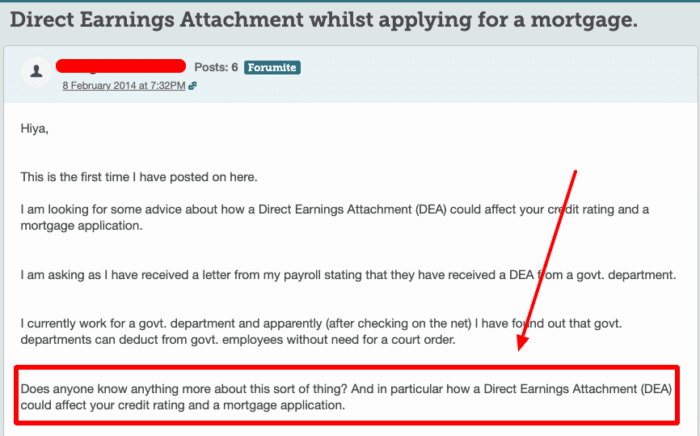Normal Rate Direct Earnings Attachment
For free & impartial money advice you can visit MoneyHelper. We work with The Debt Advice Service who provide information about your options. This isn’t a full fact-find, some debt solutions may not be suitable in all circumstances, ongoing fees might apply & your credit rating may be affected.

For free & impartial money advice you can visit MoneyHelper. We work with The Debt Advice Service who provide information about your options. This isn’t a full fact-find, some debt solutions may not be suitable in all circumstances, ongoing fees might apply & your credit rating may be affected.
Are you worried about a Direct Earnings Attachment (DEA) on your payslip? You’re in the right place to find answers. Each month, over 170,000 people visit our website seeking advice on money problems.
In this easy-to-understand guide, we’ll cover:
- What a DEA is, and why you might have one
- How a DEA could change your wage amount
- Steps to take if you think your DEA is not right
- The impact of a DEA on your ability to borrow money
- Handling a DEA when dealing with debt feels too hard
We know how scary it can be when you don’t understand what’s happening with your money; some of us have been where you are now. But don’t worry; we’re here to help.
Let’s make things clear together.
What are the Three Rates?
The three rates of DEA that the DWP and HMRC can apply to take from your earnings are:
- Standard Rate
- Higher Rate
- Fixed-Rate
As stated above, the standard DEA deduction rates are 20%, and the higher rate is 40% of your net income. The fixed rate is an option for higher or lower debts, giving some flexibility to the rate taken. GOV.UK has more information on how the deduction amount is calculated.
Applying for a lower rate is possible if the proposed amount leaves you in financial hardship. Use the budgeting tool I created for free to work out your incomings and outgoings. You must prove the hardship you’re facing to understand your finances clearly when requesting a lower DEA rate. Use the information on your budgeting form when you contact the DWP or HMRC to discuss a repayment plan or different DEA deduction levels.
Why Do I Have One?
You’ll only receive a Direct Earnings Attachment if you have a benefit overpayment, such as a housing benefit, or have received a tax credit overpayment. A DEA only relates to debts owed to Her Majesty’s Revenue and Customs (HMRC) and the Department of Work & Pensions (DWP). One of the ways that benefit overpayments or tax credit overpayments can be paid back is through your wages. This doesn’t require a court order to be set up and therefore isn’t court-enforced.
You may also have a DEA if you don’t repay social loans as agreed to when you took out the loan. These loans include
How a debt solution could help
Some debt solutions can:
- Stop nasty calls from creditors
- Freeze interest and charges
- Reduce your monthly payments
A few debt solutions can even result in writing off some of your debt.
Here’s an example:
Situation
| Monthly income | £2,504 |
| Monthly expenses | £2,345 |
| Total debt | £32,049 |
Monthly debt repayments
| Before | £587 |
| After | £158 |
£429 reduction in monthly payments
If you want to learn what debt solutions are available to you, click the button below to get started.
Will I Be Notified About It?
You will be informed when facing a Direct Earnings Attachment. You should receive a letter to let you know. You can propose an alternative to the DEA, such as setting up regular instalments to repay the debt you owe.
Will My Employer Know?
Your employer receives the details of the DEA and how much to take from your wages. Your employer will pay directly to the Department of Work & Pensions, your local authority, or Her Majesty’s Revenue and Customs.
It is a legal requirement for employers to comply with DEA instructions. If they don’t, they can be fined up to £1000.
Thousands have already tackled their debt
Every day our partners, The Debt Advice Service, help people find out whether they can lower their repayments and finally tackle or write off some of their debt.

Natasha
I’d recommend this firm to anyone struggling with debt – my mind has been put to rest, all is getting sorted.
Reviews shown are for The Debt Advice Service.
Will It Stop If I Change Jobs?
A DEA goes with you to any new jobs you get in the future. Your new employers will be informed, and the regular payments created by them. The DEA deductions will appear on your payslip in the same way it did on your old payslip with your previous employer.
» TAKE ACTION NOW: Fill out the short debt form
What Isn’t Considered as Earnings?
Not all income counts as earnings for a DEA. Excluded income for DEA includes:
- Statutory Maternity Pay and Statutory Adoption Pay
- Paternity Pay (ordinary or additional)
- Statutory redundancy pay
- Expenses
- Guaranteed minimum pension
- Benefits, credits, and pensions you get from the government
- Allowances or pay for HM Forces members
Will It Stop Me from Getting Credit?
You might be worrying about the DEA impact on your credit score, as shown by the forum user below.

However, there is no record of your DEA on your credit file. It won’t directly affect your credit score. However, if you struggle to repay debts, default on payments, or fall into arrears, your score will negatively change to reflect this. You may benefit from looking into readily available debt solutions for DEA. I advise speaking to an authorised debt advisor like the ones listed below if you are experiencing financial hardship and DEA issues.


